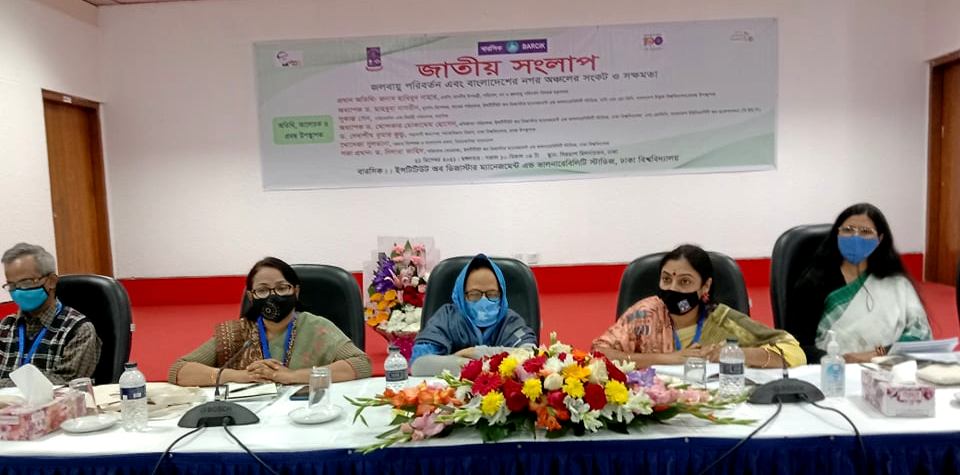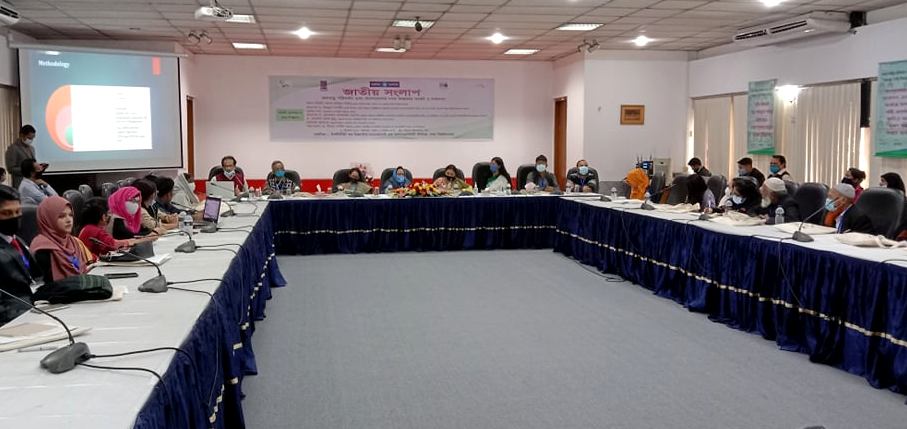‘We have to work together to combat climate change and we also have to work responsibly from our respective places.’ Honorable Deputy Minister of the Ministry of Environment, Forests and Climate Change Habibun Nahar, MP said during delivering her speech as the chief guest of a national dialogue held in Dhaka recently organized by BARCIK and Dhaka University’s Institute of Disaster Management & Vulnerability studies.

Speakers at the National Dialogue said that Bangladesh is one of the countries at risk due to climate change. Global warming and climate change have different effects on different agricultural environments in Bangladesh and among different professionals. Climate change has increased cyclones, cyclones, heavy rains, droughts, droughts, heat waves, fog, hailstorms, etc. Due to geographical location, weak infrastructure, limited resources, unskilled manpower, lack of diversified workplaces, unplanned development thinking Bangladesh has become more vulnerable to climate change and count huge loss during climate induced disasters.
The speakers also mentioned that due to climate change induced disasters, the number of displaced people is increasing day by day and they are migrating to towns for better life and livelihoods. Thus the population density and pressure in the city has increased creating pressure on the use of resources in the city, housing, health sector and food security. Besides, the urban poor living in the slum areas of the city are once again facing misery in the city as a result of various negative effects of climate change. For example, in monsoons, summers and winters, they have to deal with waterlogging, extreme heat and cold, and as a result, their income decreases, employment problems arise, various diseases increase and overall family expenses increase. Within this climate, the urban poor do not have a permanent place to live, and even the cost of housing is much higher.
Slum dweller leader Kulsum Begum said that slum dwellers are deprived in many ways. There is no education, no treatment, no place to live and they have to live with waste. When we come to this city, we lose our identity and our slum dwellers’ identity grows.

The national dialogues was escorted by Dr. Dilara Zahid, Acting Director, IDMVS, Dhaka University, Vice Chancellor of Bangladesh Open University, Prof. Mahbuba Nasrin, Executive Director of BARCIK Sukanta Sen, Vice-Chancellor, Bangladesh University of Professionals (BUP) Professor. Khandaker Mokaddem Hossain, Dhaka University Associate Professor. Debashish Kumar Kundu and others Prominent environmentalist leader Abu Naser Khan, Chairman, Save the Environment Movement (POBA), Rokon Uddin, Councilor (39), Dakshin City Corporation, Mihir Biswas, Joint General Secretary, BAPA, Shamima Pradhan, Assistant Professor, Dhaka University and Atandra Abrar Ahmed, Associate Researcher etc. Besides, Emran Hossain of New Age and Banani Mallick of Daily Observer spoke on behalf of the media in the inaugural session. Teachers, researchers and development activists presented their research papers in this national dialogue to depict the acute problems causes in urban area due to climate change.
It is to mention that according to a study conducted by BARCIK, most of the slums in Dhaka city are owned by individuals, the rest are in government places and some people are living in a floating state. Most of these slums are located on the outskirts of the city near rivers, canals, and swamps. The study result revealed that 6 percent of respondents said it was difficult for them to cope with the disaster or survive. Mosquitoes are a nuisance in the slums throughout the year. Most of the slums get flooded during the rainy season. They have to move through polluted water and mud. When it rains a lot, water rises in the houses of slum dwellers along with garbage. Their toilets, bathrooms, kitchens, water taps, roads are submerged. Every year most of the slum dwellers of Dhaka city fall into this problem during the monsoon season. Slum dwellers suffer from diarrhea, cholera, fever, cough, gastric, asthma, hypertension, diabetes, chikungunya, dengue, malaria, typhoid, kidney disease due to various seasonal disasters and spend most of their income.
Translated by Silvanus Lamin
